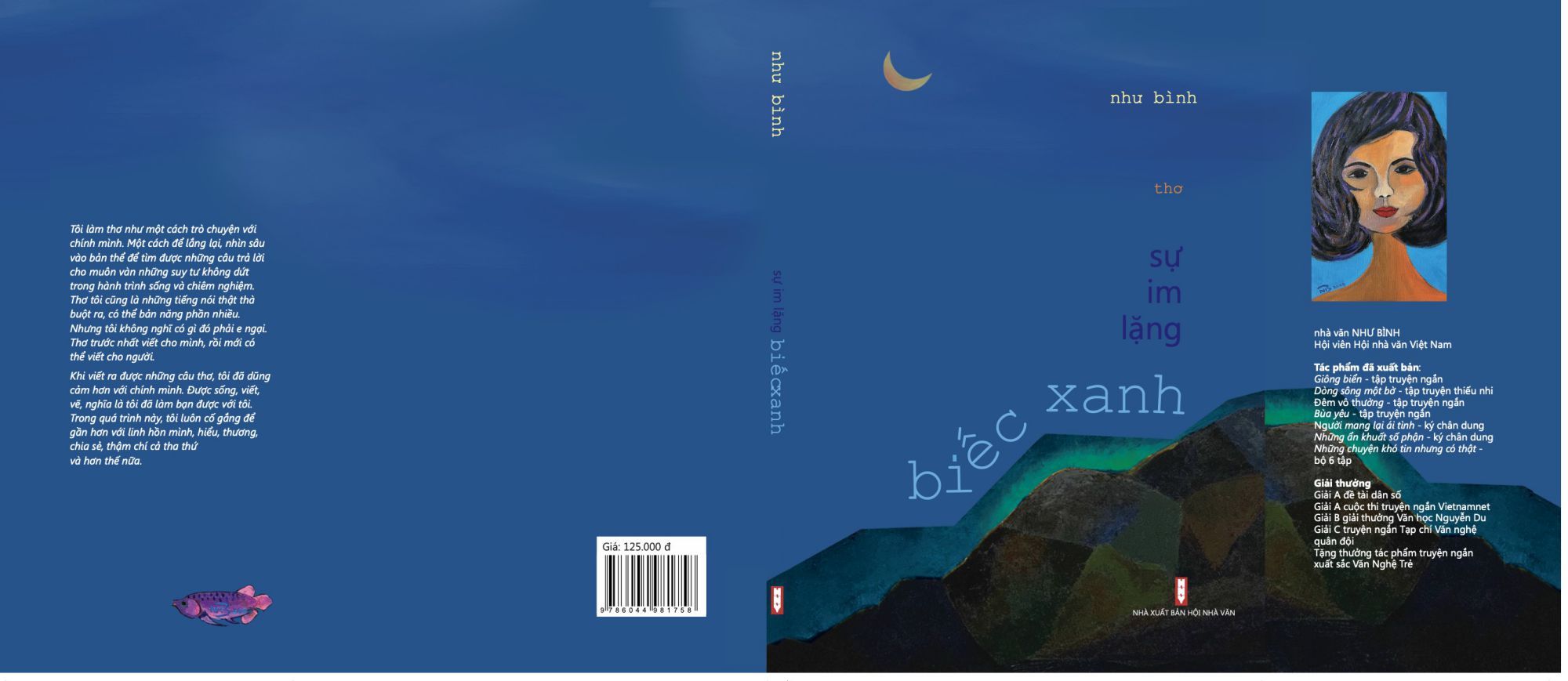However, in essence, poetry is the ultimate exposure of the inner world, the exposure of the true face of a person. And so, if lacking talent and courage, the author can easily fall into an ironic situation ("rather not write poetry"). With poetry, Nhu Binh is playing "all in".
2.
"The Blue Silence", contrary to its name, is not the poetry of "a beautiful flower, a weak soul", but a special complex of Nhu Binh. "The Blue Silence" can be seen as wild, subtle, instinctive, and dreamlike melodies. It is easy to see that the lyrical subject throughout Nhu Binh's poetry is a mature woman who has tasted all the flavors of sadness, joy, sweetness, and bitterness. There is no more autumn, no romantic cool breeze ("suddenly a cool breeze..."), the woman in Nhu Binh's poem walks in the "wind abyss" ("storm gathering", "torn clothes"), no one loves her (like "I love my long hair..."), she has to love herself: "no cool breeze for you/Autumn is just like an illusion/the rain is red, the storm is far away/you passed the season, your clothes are broken like the moon/where are you, your clothes are torn like the moon/under the vast sky, your skin is shining and crying/the cold wind is so painful, my heart is troubled/the dew is wet, the dew is anxiously holding you" (In the wind abyss).
"The blue silence" is also a state of "love" of Nhu Binh, but it is love in storms and loneliness, in other words, it is a "mental illness when in love". Let's look at Nhu Binh's unique way of thinking about love: "Thinking about love is like thinking about a "disaster"/humanity still calmly walks into the disaster to suffer/joyfully welcoming the sharp love wounds like knives/blood dripping down" (Sleepwalking).
Nhu Binh's poetry is filled with fear of death and separation, the most feared being "hunger for love". Therefore, writing about love, for Nhu Binh, is also "writing about a fear", her own specialty: "Sometimes I'm afraid of death coming at any time/death blocks me from the world/I'm confused/where to go/where to go/I don't want to be a lost ghost/I haven't had time to live/I haven't had time to love/the one thirsty for love is me, the one who loves madly is me, the one who loves like a martyr can only be me.../the woman who fears death as much as she fears dark exile/is infinitely afraid of the hunger for love (Writing about a fear).
Reading Nhu Binh, we see that the lyrical subject ("the woman in love") in poetry always has to struggle in a state of mental disturbance, sometimes sleepwalking unconsciously, sometimes depressed. It is not by chance that words, phrases, and metaphors that transform feelings such as “hallucination”, “depression”, “freeze”, “struggle”, “empty”, “broken”, “collapse”, “hearing body aches”, “fear of painful words”... appear frequently in the titles or poems of Nhu Binh, like a unique code: “My love, the world has left me/you too have left me after the trampling of the ruins/I sit frozen like a cold statue/on a nail rack, screwing me in forever/I sit depressed like the night/my heart is cold and lonely, hearing my body aching/where can I lean on to not collapse/not break, collapse, shatter, shatter/the bones remind me of the pain/the empty chest heaves and reminds me of the wandering heart” (Depression 1).
Nhu Binh's poetry is about love - lost love and unrequited, echoing desires. On the color of rage and despair, she paints a picture of "bitter love" as an absurd emotional reality: "The noisy city but I'm silent/looking for you with fear/we are like distant stars/so bright that we can't reach/... despair drives me crazy/wanting to crumple the silk clouds/collecting all the stars/wanting to bury the moon in my chest/for love/like the galaxy forever, do you know" (Written for you).
In the stormy garden, there is a depressed Nhu Binh: “I leave all my joys and sorrows behind the door of my house/to return, I am another woman/tying my heart, I am burdened/imprisoned on all sides, duties demand of me.../where can I find the dreamy girl/the romantic woman in the dark corner/biting her nails all day, her shoulders numb and sore/the sound of dishes pushing against each other also makes me afraid of painful words/and every day you come home carefree/cups of tea/pouring innocence every night/filling my depression” (Talking to You 2); there is a hesitant Nhu Binh: “It is me/who builds walls with my own hands/imprisoning my thoughts/imprisoning my desires/imprisoning myself/voluntarily setting boundaries/voluntarily tired/voluntarily depressed/but if I don't build houses for myself/am I a wandering nomad/am I not a home to return to/am I a wild animal under the moon” (Limit); and sometimes, there is a Nhu Binh who lets go: “The clouds of meditation/in the silent sky/the sun shines through/the wind shakes on all sides/but the sky has meditated for millions of years beside the white clouds/the amniotic sac of meditation ignores the storms of the distant distance” (The clouds of meditation beside the airplane window)...
Nhu Binh’s poetry both carries a very feminine destiny of suffering and is hidden as strong as a barrel of dynamite. Therefore, it is no coincidence that the destruction in her poetry always comes with collapse: “Sometimes I am so crazy/Wishing to be naked in the silent brown soil/Who will throw a party on my body/So that the baby cricket will stop crying on my chest” (The Beast); “sometimes I want to be empty/even the last piece of clothing, I want to leave it behind/Empty, I crawl into the wind/Dissolve into the soil/Turn into a river, I swim to the source” (Empty)...
But Nhu Binh's poetry is not lacking in longing (for love, beauty, compassion). That longing is always associated with a feeling of helplessness, bitterness, and insecurity: "I cannot run to tell you that I am actually very lonely/the wild beast has locked me up/though it bared its teeth and begged me with its tail tucked in/though it bit me all night in my languid longing for you" (The Beast); "In my dream last night I saw the cow again/her eyes looked at me/oh the eyes of a cow/was she crying or was it me?.../among the narrow paths made of iron mixed with her dung, I dreamed of green grasslands/among the giant milk suckers like the black mouths of an octopus/I dreamed of the steppe with the sound of calves whinnying milk in the afternoon" (The Cow).

If the lyrical subject “you” with pain is real, then the object of the heart “he” seems to be just an illusion imagined by the woman. After all, love is just an illusion: “I will miss you a lot/that room this morning the wind blew cold/the wooden chair, the persistent sound of termites in the silence/outside it is frost/missing you will torment me a lot/surrounded by your scent on every moldy moss/the cold cup of tea, the mark of your lips is still wet/who kissed your shadow” (Illusion); “This morning/when you came back/the wood on the stairs twisted and kissed your heels in a hurry/the sick room, the moss-stained wall was feverish/you opened the window wide/the sun hugged you/the wind wrapped around you/the house was in a fever/you stood still and melted/crying without understanding why/why we were separated/why we were apart for so long” (The Oblivion of the Past)
Nhu Binh is strong without being dramatic, suffering without being sentimental. The woman in her poems is always alone, sad and bored, and has no one to hold her hand in times of emotional suffering. She is tormented by love, constantly contemplating love. Nhu Binh’s poetry is the poetry of a woman who exposes her inner world. When it touches the inner world of others, it also becomes “the echo of Kieu”: “Alone/with/me/the sun shines on a lonely, skinny day/opening my hand to look at the other hand/the five fingers alone, bitter with sadness” (Alone).
Nhu Binh’s poetry is modern. In the entire collection, there are only a couple of luc bat poems, the rest are free verse. Nhu Binh skillfully restrains and maintains the rhythm of emotions, so that the poems do not overflow with emotion, and here and there, a unique voice resonates. Nhu Binh is wise enough not to indulge in word games. The smooth harmony between emotions and poetics gives her poems their own unique highlights, not mixed up. Almost all of her poems have strange ideas and good sentences.
3.
It can be said that "The Blue Silence" is a "specialty" of Nhu Binh. Reading her poems, one can recognize "a Nhu Binh inside Nhu Binh": a tormented inner person, full of desire, both emotional and multifaceted, fierce and strong. "The Blue Silence" contains an independent poetic mindset, rich in personality with many talented verses. Living and writing in the context of Nhu Binh is too difficult, but she has enough courage to overcome, especially to overcome herself, so that wild dreams can take flight. Recently, Nhu Binh has painted many paintings. Looking at her paintings, I see another Nhu Binh, both instinctive of an artist and innocent, honest to the point of innocence. But this life is not that simple. "The Blue Silence" is probably just a moment in her stormy garden. And so, I call "The Blue Silence" a "Nhu Binh's repression".










